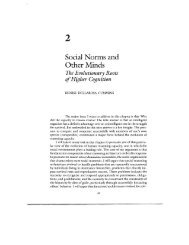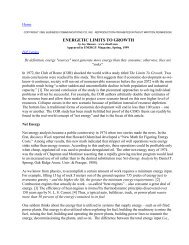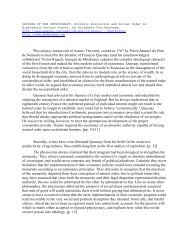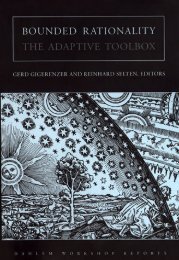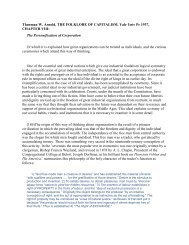DESPOTISM AND DIFFERENTIAL REPRODUCTION: A Darwinnian ...
DESPOTISM AND DIFFERENTIAL REPRODUCTION: A Darwinnian ...
DESPOTISM AND DIFFERENTIAL REPRODUCTION: A Darwinnian ...
You also want an ePaper? Increase the reach of your titles
YUMPU automatically turns print PDFs into web optimized ePapers that Google loves.
a theory of individual motivation (e.g., Ehrlich, 1936), or, in the Durkheimian tradition, explicitly<br />
rejecting the need of one (e.g., Black, 1976), have empirically determined that “law” is in fact related to<br />
power. But, without such a theory, they have been unable to explain their generalizations, or, except as<br />
a historical lesson, to offer predictions.<br />
Many of the last generation of writers on the subject of early “law” have explicitly rejected an<br />
eclipsing focus on social over individual interests. Starr and Yngvesson, for example, have complained<br />
that “A Durkheimian emphasis on harmony of interests and shared goals has heavily influenced our<br />
thinking and seems to have shaped the ways in which anthropologists have perceived the handling of<br />
disputes. . . . A major problem of most anthropological dispute settlement studies is the failure to link<br />
status, rank, and class orientations to an understanding of actors’ roles in, and outcomes of, the<br />
disputing process” (1975:559, 563; see also Pospisil, 1967:6). As members of a team of researchers sent<br />
into ten different cultures to address these problems, Starr and Yngvesson and several other students of<br />
Laura Nader confirmed that kinship, wealth, and status are generally among the most important<br />
determinants of conflict resolution (Nader and Todd, 1978). Introducing those findings, Nader and Todd<br />
admonished that “it is perhaps obvious to note that power and control over scarce resources are<br />
interconnected and relevant to disputing, and yet there has been little systematic discussion of law and<br />
the distribution of power in either the sociological or the anthropological literature. . . . We need to<br />
understand the processes whereby disputing mechanisms maintain and legitimize the distribution of<br />
power, and the means by which the powerful control disputing mechanisms” (pp. 19-20). In the last few<br />
years, a few prominent writers on law in preindustrial societies have begun in a tentative way to look at<br />
the possibility that a theory of evolved human motivation might yield predictions about and<br />
explanations of conflict resolution (e.g., Gruter and Bohannan, 1982, including Hoebel, 1982).<br />
Marxism<br />
On the subject of human society, the single most important alternative to Darwinism is probably<br />
Marxism. It is especially relevant to the subject of despotism, as the explicit end of Marxist thought has<br />
always been an end to exploitation.<br />
Marxism and Darwinism have a great deal in common. It was in large part Darwin’s work on<br />
organic evolution which inspired Marx’s, and many others’ including Morgan’s (see Terray, 1972),<br />
attempts to come up with a parallel theory of social change. Social evolution, like biological evolution,<br />
was to be explicable in terms of changing historical conditions (e.g., discussion in Bloch, 1983). And for<br />
Marx, as for Darwin, the most important of those conditions were those which effected the ways in<br />
which people solved the material problems of life: production and reproduction. These parallels are<br />
fundamental. In order personally to acknowledge his debt, Marx originally proposed to dedicate<br />
“Capital” to Darwin (ibid).<br />
In other crucial respects, though, the theories are far apart. The Darwinian hypotheses put<br />
forward here differ, first, from the Marxist insistence that the simplest human societies were without<br />
exploitation, second, from the Marxist emphasis on production, rather than reproduction, and, last but<br />
most importantly, from the Marxist prescription of a specific form of social evolution, socialist<br />
revolution.<br />
The first difference, essentially, the idea of “primitive communism,” derives from Marx and<br />
Engels’ incorporation of the work of Lewis Henry Morgan into their scenario of world history. In his work<br />
on “Ancient Society” (1877), Morgan delineated two broad plans of government: societas and civitas.



